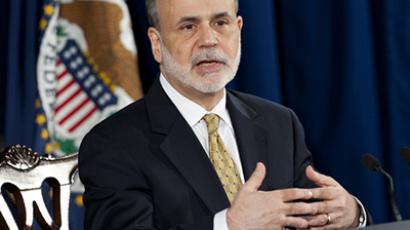US won’t tackle its economic problems ‘until Obama leaves office’
The only thing Obama’s stimulus plan did was scare people into believing the US has unpayable debts, American economist Todd Buchholz told RT. The president doesn't care enough about the country's deficit and debt, he said.
“Until the president leaves office, whether that is in January or in four years in January, it is going to be very difficult for the US to tackle these difficult economic and fiscal issues,” the former White House Director of Economic Policy said.However, the economic situation in the US is gradually improving and there will be no “going back down into a double deep recession,” he said.Young Americans looking for work should take initiative and find a job in a neighboring state, instead of waiting for a job to find them, Buchholz said, arguing that the younger US generation is no longer as mobile and motivated as it used to be in 1970s and 1980s.The US has been educating its students over the last few decades to feel good about themselves instead of learning worthwhile skills, he said.Buchholz also called the Eurozone crisis a “really bad polygamous marriage” that has become a complete disaster.
RT: In your latest book ‘Rush: Why You Need and Love the Rat Race’ you argue that in modern society there is a lack of desire to fight for anything, be it a good job or a good education. Is that pretty much so?Todd Buchholz: We’ve had 20 years of focusing on self-esteem, trying to make kids feel better about them. It didn’t matter how they did on test scores, did not matter what they knew and what they achieved, the whole point was – it did not matter. The important thing was to feel good about yourself.In Washington DC, for instance, they asked the students how they would assess themselves in mathematics. And the students felt that they had wonderful skills in mathematics, they had the best sense of themselves, they have great pride of their knowledge of mathematics, but when you look at their test scores it turned out they knew very little – if anything.So, we’ve spent 20-40 years educating people that trying hard is not very important. What’s the most important is your feeling good about yourself. But that was just complete confusion, because the best way to get self-esteem is to do something worthy of esteem. And I’m afraid that the younger people are heavily disadvantaged in a pretty harsh economic climate.Even before the ‘Great Recession’ which began in 2008 we were seeing, over the course of the last 20 years, a decline in the willingness of young people to simply move to another state in order to take a job. We’ve seen a decrease in mobility. Yes, the ‘Great Recession’ has made things worse, has made people even more nervous and worried about their futures, but those trends were placed beforehand.RT: Do you think Americans really are becoming those people who need a three-hour lunch? You dubbed them as generation “born to sit”.TB: Bruce Springsteen in 1970s had a famous rock song called ‘Born to run’. He wrote about a generation that couldn’t wait to get their driving licenses, couldn’t wait to get on the road to explore the country.In a study done recently we see that young Americans are less interested in getting their driving licenses. In the 1970s and 1980s every high school student wanted to turn 16 or 17 to have a driving license. Now many of them are waiting till 18-20 – is that a cause of economic decline? No, but I think it is a symptom of a lack of motivation. So instead of being born to run they seem born to sit on the sofa in front of X-Boxes and PlayStations or their iPhones.Of course there is a portion of the young population that is very, highly motivated, that is very ambitious and very aggressive and certainly is carving great careers for themselves. I’m certainly not going to suggest that the entire generation is sitting on the sofa. However, we have, especially in this harsh economic climate, certain states in the US which are prospering, where the job market is very healthy and other states where it is very poor.You can rent a car, you can hop on a bus, it would only cost about $200, to get yourself on a bus from Nevada, a state with a terrible economic climate, to North Dakota, where you would have a job almost as soon as the bus arrives. And yet we’re not seeing people making those sorts of moves. They seem to be waiting in place for the jobs to come to them. And I’m afraid it is not a very promising way to look at the job market these days.RT: So, the go-go days of the 1990sturned into the go backwards days of the 2000s, so where next?TB: The US economy is above what a pilot would call “stall spin”. We certainly are growing fast enough, I believe, that we’re not going back down into a double dip recession. But the job market is painful. The job market is very weak. I think President Obama hasn’t done much to help the job market. I don’t think his stimulus plan was very effective.The only thing the stimulus plan did was scaring people into believing that we now have debts that will be unpayable. And that the US debt to GDP ratio was simply beyond manageable.We’ve the economy that is slowly repairing itself. What we seem to be avoiding are tough decisions when it comes to how we’re going to pay for our debts in the end.RT: Can we expect another stimulus plan?TB: I don’t think there is going to be another stimulus plan out of the US Congress. Certainly, Republicans will not be in favor of it because they see it has been a waste. President Obama recognizes that the prior stimulus plans are no longer popular. In fact I’m not even sure he will use the word ‘stimulus’ any more because now it has a tone of being negative, because very few Americans believe it has created any jobs, except maybe for some government bureaucrats.President Obama 1.5-2 years ago appointed a commission to examine the US fiscal deficit debt problem. He appointed a well-known former Republican Senator and a very distinguished adviser to President Clinton, obviously the previous Democratic president. Those two individuals, with their staffs, with Congressional colleagues spent months studying the deficit and the debt. That was the Simpson-Bowles Commission. The President appointed them. And they came back with a plan that was very tough, very bold, that would cut some tax rates to make the US corporations more competitive. But at the same time they would cut spending across the board, including the retirement schemes.The President was presented with this plan, and even though he chose the members of the commission – he walked away from the plan. Because President Obama doesn’t care enough about the deficit and the debt.I think until the President leaves office, whether that is in January or in four years in January, it is going to be very difficult for the US to tackle these difficult economic and fiscal issues.RT: Right now it looks like almost nothing that we have to be safe, the very currencies that we use, and the biggest banks in the world. What is safe now?TB: There is always going to be some fear on the market except when there is a bubble. There is no bubble now so there is some fear on the market. And there is a big question mark over all paper currencies. There is a question mark about the value of the dollar, the euro, the yen, the rouble and every other currency that is not backed by some hard assets.We have a positive sign next to GDP. Not that it is a big bright ball sign – no! Sometimes it fades, sometimes it highs a little bit. But I think there has been a demonstration that the US corporations aren’t managed so badly after all. And they came to withstand a pretty weakened economy. That will, I think, be giving investors a little bit more confidence in the market. And of course that confidence has always been expressed in the pretty healthy rally over the course of the last year.RT: More than 10 years ago in your book 'Market Shock', you warned that the Eurozone was unstable and heading towards political turmoil. You also said that the members of the Eurozone would stumble because of the differences in monetary policies. What is your forecast now?TB: I think the Eurozone is like a really bad polygamous marriage. A bunch of wives and one husband constantly fighting and jealously disagreeing. The Eurozone is a mess because they were never meant to be together. Ireland was a more inflationary place – as was Italy, Germany had lower inflation – they needed different monetary polices. And now we’ve got this disaster – and it cannot simply be solved by the European Central Bank writing some cheques.Greece is simply insolvent and uncompetitive. If Greece still had the drachma – it would have been devalued. There would be tourists from all over Germany flooding into Greece, bringing foreign currency, bringing their euros to Greece, the hotels would be full. Instead – what do you have? You’ve got an economy that has a big tourism base, but tourists won’t go because they are afraid of riots on the streets, the prices haven’t fallen because they’re denominated in euros. So you have empty hotels.It is very difficult to see how Greece survives as a member of the Eurozone. It may very well be that on some busy weekend, when no one is paying attention, during the World Cup match or something, that Greece will exit the Eurozone, hoping that nobody notices it. But it is going to be awfully hard to keep them in.














